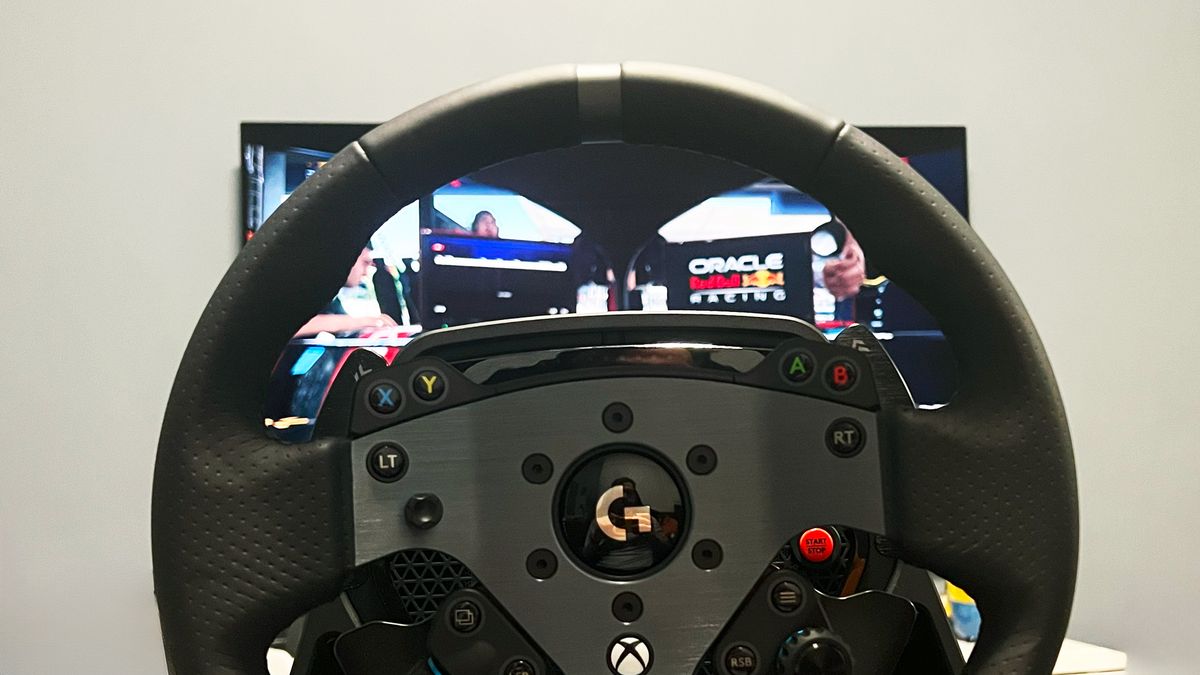12DOVE Verdict
To borrow Max Verstappen’s trademark line, the Logitech G Pro Racing Wheel, and the matching G Pro Pedals are simply lovely. And much like Verstappen’s 2023 Red Bull F1 car, they’re a high-quality upgrade on a successful previous iteration that now delivers even better results.
Pros
- +
Powerful 11nm force feedback
- +
High-quality build and feel
- +
Dual paddles offer nice accessibility
- +
Highly customizable
- +
Load cell brake pedal
Cons
- -
Expensive
- -
Largely plastic construction
- -
Scratchy wheel stitching
Why you can trust 12DOVE
Logitech has been a go-to name for racing sim equipment for years, but the Logitech G Pro racing wheel feels a lap ahead of the brand's previous gear. You’ll find Logi's casual steering wheels in living rooms the world over due to their popularity, but where you wouldn’t have found its logo before was bolted to the cockpit of more serious racers.
The Logitech G Pro Racing Wheel and its matching pedals are most definitely out to remedy that. They’re both Pro by name, pro by nature, and pro by price too. The G Pro Racing Wheel is Logitech’s debut direct drive for ‘proper’ sim racers, offering smooth control with a punchy 11nm of torque. Underfoot is another Logitech first - a load cell brake pedal in a customizable, modular system.
Together they form an enticing pair but one that will set you back a chunky £1348/$1348 price tag on Xbox/PC or PS5/PC, which sits the package towards the very top end of the best racing wheels. Admittedly, you do pay for performance in this game though, so will the Logitech G Pro take the chequered flag first?
Design
At first glance, there’s something I find oddly pleasing about the design of the Logitech G Pro Racing Wheel and for me, it’s a case of genetics. I’ve extensively used the Logitech G920 in the past and the G Pro keeps that same visual DNA that makes it feel like a natural evolution. It’s as though the G920 has matured, it’s gone away to uni and come back a whole new person... well, a whole new wheel - you get the idea.
Everything is a bit bigger, a bit smoother, and a bit more premium (and then some). It’s an improvement in every way, though like its younger sibling, everything is also plastic. Having paid £999/$999 for a racing wheel, you’d be forgiven for expecting to see a bit more metal across the build of the G Pro’s remarkably large base, though both from a distance and up close the plastic doesn’t look or feel cheap. After all, plenty of the best PC controllers feel as premium as anything, and you don't often find metal in their bodies.
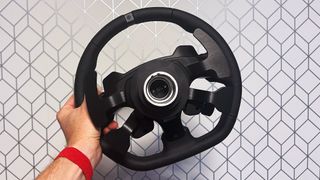
Stylized grilles cover the front and back of the Logitech G Pro base and add a touch of flair to an otherwise plain chassis. They serve a purpose beyond aesthetics though with active onboard cooling hidden inside. The fan isn’t silent but was also never loud enough to be noticeable over the game audio. It’s a smooth operator too and I noticed no clips or rattles across a few hours of testing. What I did notice, however, is the fan never wanted to turn itself off, even with the Xbox Series X and Logitech G Pro both fully switched off the fan purred constantly on its lowest setting unless the USB cable was pulled out.
Around the back, a USB hub provides connection points for the G Pro Pedals (which you’ll need to buy separately) and other accessories like a gear shifter. This USB approach for peripherals is fine and saves on case-side USB ports for folks playing on one of the best gaming PCs, but it also means the G920 pedals aren’t compatible without a paid adapter. if you're graduating to the G Pro from one of the older Xbox steering wheels, maybe have a check to see if your pedals will be compatible here. Somewhat strangely, Logitech has opted for a micro-USB connection between the wheelbase itself and the PC/console, it’s recessed in a molded housing so alignment isn’t an issue but surely a premium 2022 release of this price warrants USB-C?
Features
Under your fingertips, you’ll find magnetic gear shift paddles which feel wonderful in action. The movement is crisp and responsive with a soft clack giving nice audio feedback at the same time - not dissimilar to the Xbox Elite Series 2 at times, or some of the other best Xbox Series X controllers. Below them is a pair of dual-clutch paddles with greater and smoother travel than their magnetic counterparts. These can be bound to a number of options like acceleration and braking by using either Logitech’s G Hub software on PC or the onboard controls - a nice accessibility option.
There’s an almost overwhelming amount of buttons and inputs across the face of the wheel in what Logitech calls a “thumbsweep layout”, with everything hugging the outer edge of the central, metal-plated panel. While they’re never far away I found that apart from the outer letter buttons, nothing was within reach without adjusting my hand position. The two twist knobs are a nice addition though I found there was limited support for them in the Xbox games I tried.
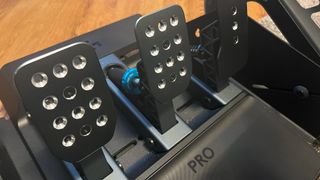
From a design and build standpoint, the Logitech G Pro pedals might well be Driver of the Day. There’s a lot on offer here, though you’d want there to be given the pedals alone cost more than the complete Logitech G920 wheel and pedal combo. The frankly massive footprint houses three pedals with an impressive amount of modular customization on offer. Each can be moved side to side, the pedal faceplates can be seated in a range of positions or you can get rid of one entirely if you’d rather just a two-pedal setup. I also found no bother in using these with a bespoke gaming chair like the Playseat Trophy Logitech G Edition.
Once again there’s a fair bit of plastic in the G Pro Pedals but they’re rock solid overall with metal faceplates that should stand the test of time. There’s ample platform space for your heels and while plastic, it’s heavily textured and offers enough friction to stop feet sliding around. Speaking of which, cleverly Logitch has gone with a flat edge to the back of the G Pro Pedals, so it’ll butt up securely against a wall if you’re not using a cockpit.
Performance
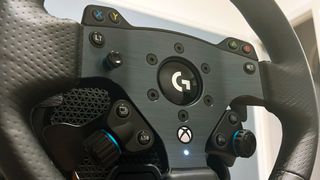
It feels like a safe bet to assume that a Logitech G Pro is not going to be your first racing wheel and chances are you’ll be looking to upgrade from one of the belt or gear-driven options in our list of the best PS5 steering wheels. If you’re wondering whether moving to direct drive is much of an upgrade? It is. It massively is.
After bolting it to the Playseat Trophy Logitech G Edition (which is excellent, by the way) I found the difference between the gear-driven G920 and the direct-drive G Pro wheel astonishing. I expected it to feel better but didn’t expect it to feel quite this good.
Rather than the loud, clunky movements of the G920 the G Pro is buttery smooth with resistance that feels much more like driving an actual car (not that I’ve ever sent it 300kph into a chicane in my Mazda 3 before). It makes for a far more immersive gaming experience, the Logitech G Pro wheel doesn’t feel like a controller anymore - it sucks you out of one of the best console gaming chairs and into the seat of whatever virtual car you’re driving. In short, it's a total delight. Couple this with the Playseat Trophy racing seat and I might as well have been on the track.
The Logitech G Pro Racing Wheel is capable of delivering up to 11nm of torque and it’s not afraid to remind you of its power, particularly in off-road situations. Driving around Mexico in Forza Horizon 5, the G Pro Wheel fought me through every turn and scolded me for asking too much of any car. Flying around Spa in F1 23 I could feel the mechanical forces of the car through my forearms, particularly in high-speed corners or if I was too keen to get the power down.
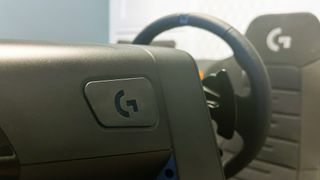
The force feedback on offer with the Logitech G Pro feels remarkably different from what you experience with a wheel like the G920. It’s like moving from your TV’s built-in speakers to one of the best gaming sound systems with 7.1 surround sound. Both are doing the same thing, but one is doing it with a lot more detail and oomph. While in some (though admittedly very few) games this is down to TrueForce, I still found in games without TrueForce support that the standard force feedback felt like an entirely different sensation.
TrueForce attempts to take this a step further by plugging deeper into the game engine to offer tactile feedback to things like the road surface and curbs. It’s cool? I think? It’s hard to definitively say as the amount of games properly supporting it is limited and the base level force feedback is already impressive to begin with. I could certainly feel a difference while tearing around the track in GRID (which does support TrueForce), compared to games that don’t. But then I could also feel a difference between F1 23 and Forza Horizon 5 - neither of which has TrueForce anyway. The main takeaway is, everything felt great.
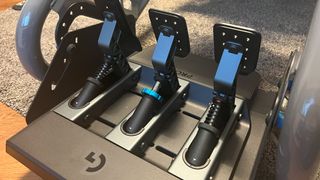
The front of the base features a bright line of customization, colored rev lights, and a small but clear monochrome OLED display. The display unlocks the same customization options you’d find in the G Hub software and it’s a great quality-of-life add for console gamers to be able to configure everything onboard. You’ll find control over areas like force feedback strength and button/paddle mapping as well as the ability to save different profiles which is a welcome addition for multi-racer households. When you’re not three pages deep in menus this screen also acts as a digital readout of input strengths which I found particularly handy for getting to grips with the G Pro’s load cell brake pedal.
In another notable step up from the pedals included with the G920/923, the £349/$349 and separately sold Logitech G Pro Pedals are a joy to use. Not only are they larger than on previous models but inputs feel finer and more responsive, again, much more like a real set of pedals rather than a facsimile.
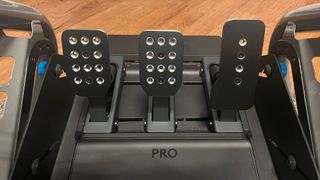
Beyond their simple high quality, customization is the highlight of the Logitech G Pro Pedals, especially because you have the ability to control the feel of each pedal independently. Both the accelerator and clutch pedals share a set of four springs with differing resistance levels and these are easily swapped out in a matter of seconds thanks to a clever quick-release mechanism. The whole design feels comparable to a modular build gamepad like the Thrustmaster Eswap XR or the Victrix Pro BFG.
The load cell brake pedal operates on pressure, not translating distance, so required a lot of getting used to. That said, this was also the area I found most highlighted the quality of the unit as a whole. A combination of different colored elastomers allows you to control how firm the brake should feel and after trying a couple of options I felt far greater control over braking than with a traditional pedal. This was really noticeable in F1 23 where the improved G Pro Pedals drastically improved my lap times after just a few attempts.
Should you buy the Logitech G Pro Racing Wheel?
To borrow Max Verstappen’s trademark line, the Logitech G Pro Racing Wheel, and the matching G Pro Pedals are simply lovely. And much like Verstappen’s 2023 Red Bull F1 car, they’re a high-quality upgrade on a successful previous iteration that now delivers even better results. Not only are the 11nm strong force feedback wheel and 100kg load cell brake pedal an immersive joy to use, they actually made me a better sim racer and improved my lap times.
There’s a rather large elephant in the passenger seat, of course, £999/$999 for the wheel plus a further £349/$349 for the pedals will be eye-watering for most - particularly with direct drive options from other brands well below that.
The fact remains though, the Logitech G Pro racing setup is very, very good so if you can stomach the price you won’t be disappointed.
How we tested the Logitech G Pro Racing Wheel
I used the Logitech G Pro Racing Wheel and Pedals with an Xbox Series X for a couple of weeks. Throughout testing, it was bolted to the Playseat Trophy Logitech G Edition, though a desk clamp is also included in the box so a bespoke cockpit seat isn’t required.
I drove a number of races in a mixture of F1 23, GRID, and Forza Horizon 5 while trialing different settings on the G Pro Wheel and switching between springs and elastomers in the G Pro Pedals. I compared my experience closely with the Logitech G920, as this is the racing wheel I have the most experience with, and I'd wager a lot of folks will be interested in upgrading from when considering a purchase of the G Pro.
For more on how we test the latest gaming tech here at 12DOVE, take a look at our hardware policy.
Want more from the world of controllers? Check out the best PS5 controllers, the best joysticks, and the best Xbox One controllers.
Alex is a streamer who has been creating gaming content for over a decade, streaming on Twitch regularly across the last five years. With a degree in film and a background in sports media, you'll find him jumping between 60,000 seat stadiums and his Animal Crossing island (where he's growing pears, in case you were wondering).

Gen V creator gives exciting update on second season of The Boys spin-off

Bill Murray regrets not working with one director in his illustrious career: “It’s one of the few regrets I have is that I didn’t do it."

Ryan Coogler promises "I’ve got every intention of working" with Denzel Washington on Black Panther 3
